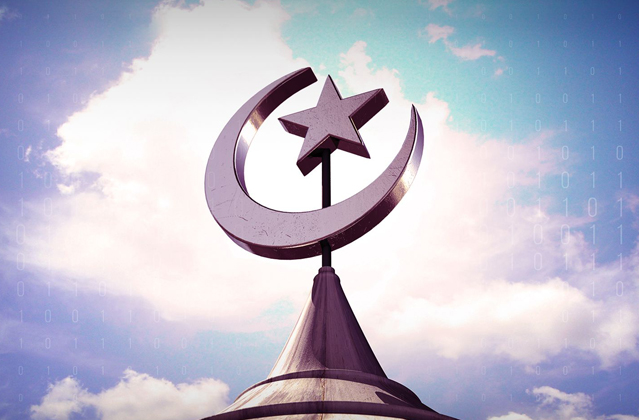The Prophet ﷺ in His Last Sermon said,
| All those who listen to me shall pass on my words to others and those to others again; and may the last ones understand my words better than those who listen to me directly. |
From this it is clear that the responsibility of relaying Allah’s ﷻ message after the Prophet ﷺ, has been laid down upon the whole Muslim community.
The best daa’i in the world was undoubtedly the Messenger of Allah ﷺ. So it is then understood, that to be a daa’i in today’s world one should closely observe the methods which were used by our beloved Prophet ﷺ in order to formulate the basic steps in spreading the word of Allah ﷻ.
Dawah and The Da’i
Da’wah is an Arabic word derived from the root word da’aa; meaning “to call” or “to invite” (Da’wah A-Z by Dr. Bilal Philips, pg 1). In the AlMaani English-Arabic dictionary the word is defined as such: “is to call, call out to, request – ask somebody, especially politely, in speech or writing to do something, to call upon, appeal to, invite.” Hence, a person who calls people to the word of Allah ﷻ, either voluntarily or in a group, is called a daa’i.
From this we can conclude that the task of inviting people to Islam, creating an awareness among people about their real purpose in this life, and the like, is termed da’wah, and that the person who performs this task is known as a daa’i.
The Prophet’s Life in Makkah
The message which the Prophet ﷺ brought to Makkah was in total contradiction with the idolatry practices that the Makkans followed at that time. As the kaa’bah was situated in Makkah, the Makkans took great pride in it as it was a source of honor and respect for them being the caretakers and trustees of kaa’bah. As his ﷺ message was completely contradictory to the practices and beliefs of the Makkans, the Prophet ﷺ started his mission secretly. He first invited people who were close to him, and this period of confidential invitations lasted three years. During this period even actions like performing salah were done secretly. Only after these three years, did the Prophet ﷺ proclaim the message of Allah ﷻ openly and in public.
Except for a few, most Makkans opposed his message. The ones who did accept Islam in its early stages were mostly from the poor and weak for not having any support, and the non-believing Makkans formed different groups in order to abuse them. The Muslims were tortured so much that they were forced to migrate to Abyssinia. It was not too long after that the Muslims were socially and economically boycotted. It was a period of test and trial for the Muslims, having faced a lot of hard times during this boycott.
Following that, the death of Abu Talib and the Prophet’s ﷺ wife Khadijah (RA) formed the year of grief for the Muslim ummah. After the death of Abu Talib, the Makkans conspired against the Prophet ﷺ to either kill him or imprison him. In spite of all this, the Prophet ﷺ kept approaching different people in order to convey the message of Allah ﷻ. He ﷺ even migrated to Taif, but only faced rejection from everywhere. It was at this time that Allah ﷻ opened the gates of Madinah for the Prophet ﷺ and his companions. [Sayyid Abul Ala Maududi – Tafhim al-Qur’an-surah Al Anaam & The Noble Life of Mohammed ﷺ by Mohammed Abdul Hai]
How the Challenges that The Prophet ﷺ Faced Formed How He Gave Dawah
First:
The Prophet ﷺ began his da’wah by first calling upon his relatives. It was a challenge for the Prophet ﷺ to call upon his relatives such as his uncle and aunt who followed a religion in total contradiction with the message of Allah ﷻ but the Prophet ﷺ never gave up hope and called his relatives repeatedly. Hence, while doing da’wah it is obligatory for us to convey the message first to those nearest to us.
Second:
It was challenge for the Prophet ﷺ and his companions to stay patient while the Makkans abused the converted Muslims, but were able to bear it due to their strong faith and sincere belief and trust in Allah ﷻ. Whenever da’wah is done, its approach should affect the masses in such a way that it makes them spiritually strong and hence bring them from ignorance to light.
Third:
It was also challenging for the Prophet ﷺ after facing refusal (to accept Islam) from the people of Taif, but the Prophet ﷺ continued to invite tribes during the hajj season. From this it is clear that da’wah should not be confined to any limitations but it should be done at every place where people gather. Apart from this, da’wah should not be stopped if it is not getting any positive response as it is Allah ﷻ who changes/turns the hearts of the people.
Fourth:
It was additionally difficult for the Prophet ﷺ to prepare the Muslims for the first battle, the battle of Badr. During this period, Muslims were very few and this formed a challenge for the Muslims in having to battle with the Makkans. But as Muslims were very strong in their belief, and their trust and love for Allah ﷻ and His Messenger ﷺ was so much that they were ready to do anything. As a result of their strong belief, Allah gave the Muslims victory. Therefore, the Muslims were having sincere faith and Prophet ﷺ was a true guide. The da’wah approach should be sincere so that Allah ﷻ may fill the hearts of the masses with guidance. [The life of Prophet Mohammed ﷺ highlights and lessons by Dr. Mustafa as-sibaa’e]
Characteristics of A Daa’i
Knowledge:
Before imparting knowledge to others it is necessary to acquire knowledge. While inviting people, a caller must never feel weak because of lack of knowledge. Allah ﷻ also instructed in the Qur’an,
| “Say: This is my way and I invite to Allah with certain knowledge.” [Surah Yusuf 108] |
The Prophet ﷺ is also reported to have said,
| When there are no people of knowledge available, people will make the ignorant men as their leaders and hence become astray. [Bukhari] |
Patience:
It is necessary for a caller to work patiently and calmly. As Allah says in Qur’an,
| “And We appointed, from among them, Leaders, giving guidance under Our Command, so long as they persevered with patience and continued to have faith in Our Signs.” [Surah As-Sajdah 24] |
Responsible:
Every Muslim is responsible for conveying the message of Allah ﷻ to the masses, hence it also forms the greater responsibility for a daa’i to convey the message of Allah ﷻ. As Allah ﷻ says in the Qur’an,
| “Your responsibility is only to convey [the message] and the accounting is on Me.” [Surah Ar-Ra’d 40] |
Wisdom:
A daa’i should be capable enough to take things in a positive manner whenever required. He/she should be able to understand the situation and get adjusted to it using authentic sources. Allah ﷻ says in the Qur’an,
| “Call to the way of your Lord with wisdom.” [Surah An-Nahl 125] |
Gentle:
Being gentle while conveying the message makes people attracted toward the message and the listener will calmly listen to the message, where as being harsh may discourage the listener. Hence the daa’i needs to be gentle in their speech. Allah ﷻ says in the Qu’ran,
| “And by the mercy of Allah you dealt with them gently.” [Surah Ali-Imran 159] |
Morality:
A daa’i should have high moral standards just as the Prophet ﷺ was a man who held high standards in manners and the Muslims followed him. Allah ﷻ says in Qur’an,
| “And indeed, you are of a great moral character.” [Surah Al-Qalam 68] |
The Prophet ﷺ also stressed on this trait by saying,
| The best of you is the best among you in conduct. [Al-Bukhari and Muslim] |
The wisdom in that the da’wah had taken place secretly for the first three years of revelation, shapes the function of the daa’i in such a way that if the call is being done in a totally unfamiliar place, then the daa’i need not proclaim the call openly until a minimum number of supporters has been attained, so that after proclamation if the leader is being harmed then the other members could carry out the message further to masses.
The Prophet’s ﷺ wisdom in also having some of his companions migrate to Abyssinia shapes the role of a daa’i in such a way that if a daa’i finds its companions in any danger, a leader can make them move to any safer place. [The life of Prophet Mohammed ﷺ highlights and lessons by dr. Mustafa as-sibaa’e]
In the present day, Islam is judged by its people and not necessarily by reading the teachings of the Quran and Sunnah. Hence this forms the greater challenge for a daa’i to clear the misconception about Islam. The misconceptions such Islam allows people to kill innocents in the name of jihad, Muslims are extremist, Islam is spread on the basis of sword, etc., and to provide clarity on topics such as a Muslim woman’s dress code, polygamy, and the like. These are all the common challenge questions which people ask a Muslim daa’i. During the Prophetic era, the Jews and people of other faiths used to ask several questions from the Prophet ﷺ. Therefore, even today people ask questions due to ignorance claiming that Islam is not a peaceful religion.
A daa’i should choose the most appropriate approach while delivering the message, and should be clear in his conversation while communicating with the masses. While talking to any person, one should listen to the person calmly and patiently and read the situation before explaining to them. A daa’i should always refer to the Prophet’s ﷺ way of life and his methodology while doing da’wah. It is a work of a daa’i to just convey the message of Allah ﷻ and then,
| “He (Allah) guides whom He wills to a straight path.” [Surah Al-Baqarah 142] |

















































